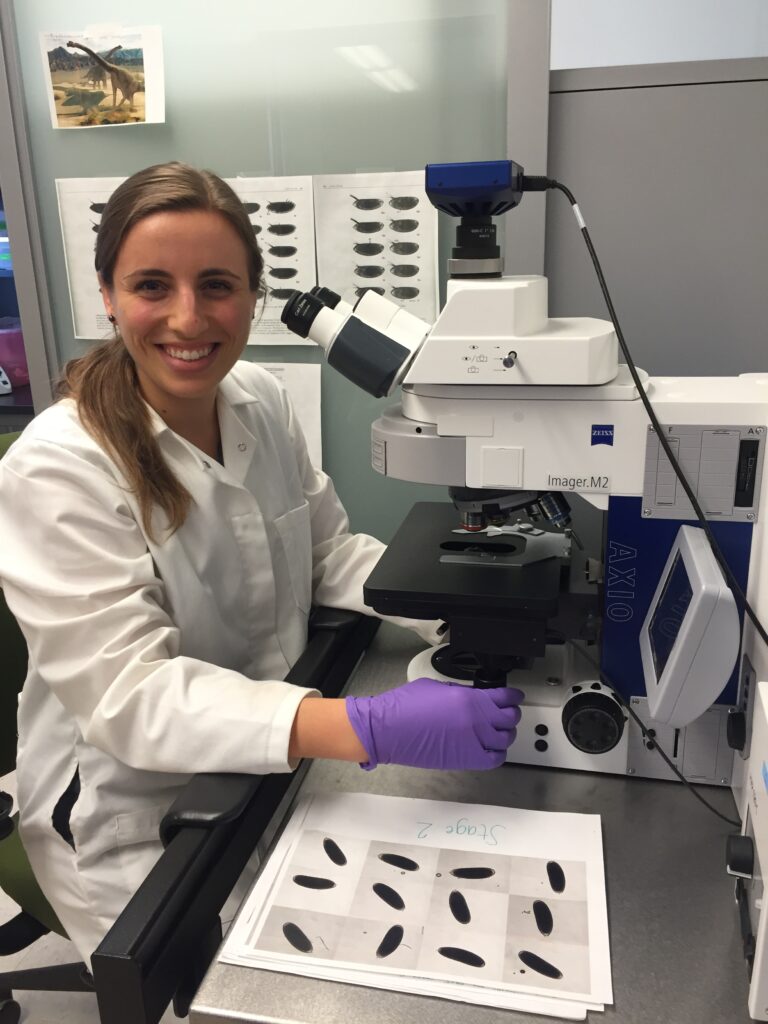Meet Dr. Cartwright!
The pre-health to pre-research track is one often taken by biological sciences students, and there’s a reason why it’s so popular: science is really cool! A few years ago, Dr. Emily Cartwright was one of those students and is now one of the BIT Program’s newest teaching postdoctoral scholars. Coming all the way from California, she fits right in with the faculty and is ready to spend the upcoming semesters learning all that she can.

Dr. Cartwright earned her Bachelor of Science in Molecular and Cell Biology from the University of California, Berkeley. She entered college as a pre-med student, but once she started working in a research lab, her career goals shifted. “It was really exciting because I liked being in the lab, collaborating with people and getting to ask different questions, figure them out and problem solve to get the answer,” she said. She mentioned how many of her peers were pre-med and how it just seemed like the right thing to do, until she realized that “doing the science” was a lot more enjoyable than hearing about it in a lecture hall. “There are so many different pressures in college, I definitely, really had to think about [this career goal change], like is this really what I want to do?” she said, quoting her former self. Hands-on research often makes comprehension of complex molecular topics more feasible, and is usually more fun for young scientists!
After Dr. Cartwright graduated with her bachelor’s, she started her PhD at the University of California, Davis where she pursued Biochemistry and Molecular, Cellular, and Developmental biology. She studied the early developmental mechanisms across different species of fruit flies. “When you think of Drosophila, you think of Drosophila melanogaster, which is the model system. But there’s actually a huge diversity [in the genus],” she explained. Dr. Cartwright used these different species to examine gene regulation through transcriptomics, which is the study of the entire mRNA library produced from a genome under a given condition. Her lab was unique in that there were only three total graduate students but lots of undergraduates. “We would have [the undergraduates] come to lab meetings and they would present their research and we would give feedback, which was really cool,” she said. These interactions were just one part of her graduate career that gave her the opportunity to work with students and realize her passion for teaching.
“I enjoyed creating a community within my classroom where people felt comfortable engaging.”
-Dr. Cartwright
In addition to her lab work, Dr. Cartwright was a teaching assistant (TA) for about five years as a graduate student. “[Me TA’ing] started as something my advisor recommended because I wanted to improve my public speaking, but it became something that I really enjoyed,” she said, elaborating on how she loved working with the students and figuring out the best ways to explain different concepts. “I enjoyed creating a community within my classroom where people felt comfortable engaging,” she said, “and it was just fun to work with students and hear about their interests and what makes them really excited about science.” These are the ideals that led her to looking for teaching postdoc positions, and eventually (and thankfully!) land here at the BIT Program.
Dr. Cartwright is currently co-teaching BIT 410/510 Manipulation of Recombinant DNA with Dr. Noel and BIT 501 Ethical Issues in Biotechnology with Dr. Dums. She mentioned how fast her first two months with the program have gone by but how exciting it has all been. “I moved out here [to North Carolina] about two weeks before the semester started, so I didn’t have a lot of time before classes started… but I’ve already learned a lot and everyone has been really nice about incorporating me into the teaching community,” she said. In addition to the two classes she’s teaching, she has also been given unique side projects and is even helping develop course content for an online module that is in the works. In the future, Dr. Cartwright will create her individual BIT lab module based on her PhD work, having students use Drosophila transcriptome data to determine DNA binding sites and their associated proteins in order to further understand gene regulation.
Since Dr. Cartwright is only a few weeks into her time with the BIT Program (and on this side of the country), she is still getting adjusted to her new environment. “My short term goals are to develop better teaching practices so I can implement them while I’m here… I want to soak it all up,” she said. Her future goals include becoming a professor. In the meantime, she advises students to follow their interests and explore different programs as much as possible. “Feel free to explore and ask questions,” she said. For any student who is in the same position Dr. Cartwight once was, struggling with the idea of exploring options outside of health professions, know you have a place at BIT!